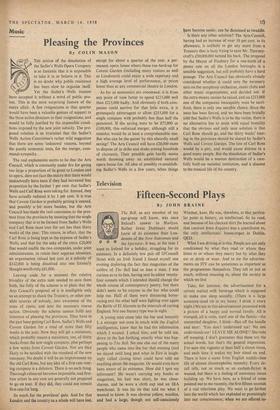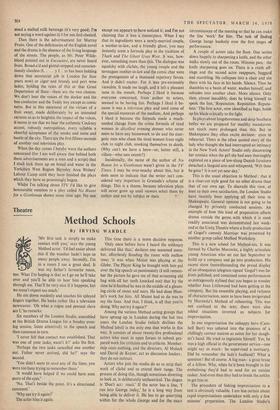Television
Fifteen-Second Plays
By JOHN BRAINE The Bell, as any member of my age-group will know, was once Ireland's answer to Horizon. Rather fewer Dubliners would know of its existence than Lon- ® of the New Statesman and 0 ® ® the Spectator. It was, at the tithe I went to Ireland for a holiday, struggling for its existence. In a definitely low pub off O'Connell Street with an Irish friend I found myself one evening deploring the fact that magazines of the calibre of The Bell had so lean a time. I was curious as to its fate, having sent Its editor twenty- four sonnets which I intended should change the whole course of contemporary 'poetry; but there didn't seem to be anyone in the bar who could help me. Half of them were discussing horse- racing and the other half were fighting over again the Battle of El Alamein in the intervals of cursing England. Not one literary type'was in sight.
A young man came into the bar and instantly I, a stranger not even in touch with the English intelligentsia, knew that he had the information which I wanted. I asked him; and he told me, down to the last farthing, exactly what was hap- pening to The Bell. No one else out of the many people who came into the bar that evening (and we stayed until long past what in Eire is laugh- ingly called closing time) could have told me anything about the magazine. Or would even have been aware of its existence. How did I spot my informant? He wasn't carrying any books or magazines, his hair was short, he was clean- shaven, and he wore a cloth cap and an IRA trenchcoat. It was his tie that told me what I wanted to know. It was chrome yellow, woollen, and had a large, though not self-consciously Windsor, knot. He was, therefore, at that particu- lar point in history, an intellectual. So he read, and because of his checked shirt (he learned about that contrast from Esquire) Was a contributor to, the only intellectuals' house-organ in Dublin. QED.
What I am driving a't is this. People are not only conditioned by what they read or whom they listen to or whom they marry but by what they eat or drink or wear. And to me the advertise- ments on ITV can be sometimes as important as the programmes themselves. They tell us just as much, without meaning to, about the society in which we live.
Take, for instance, the advertisement for a certain malted milk beverage which is supposed to make one sleep soundly. (There is a large economy-sized tin in my home; I drink it every night.) We are in this advertisement presented with a picture of a happy and normal family. All is tranquil, all is calm, until one of the family—the unmarried daughter, I think—flies off the handle and says: 'You don't understand me! No one understands me! LEAVE ME ALONE!' She runs off weeping. I don't guarantee that these are the actual words, but that's the general impression. I've seen this vignette at least half a dozen times, and each time it makes my hair stand on end. There is here a scene from English middle-class life of almost claustrophobic intensity. Every de- tail tells, not as much as an eyelash-flicker is wasted, but there is a feeling of enormous issues building up. We have here, as a friend of mine pointed out-to me recently, the first fifteen seconds of a real television play. We want to go farther into the world which has exploded so promisingly into our consciousness; when we are offered in- stead a malted milk beverage (it's very good; rm not saying a word against it) I for one feel cheated.
Then there is the advertisement for Murray Fruits. One of the deficiencies of the English novel and the drama is the absence of the living language of the streets. The people, as Mr. Peter Wilde- blood pointed out in Encounter, are never heard from. Broad-a'd and glottal-stopped and conscien- tiously classless (L . . . y J . m has been holding down that secretarial job in London for four years now) or cigar and brandy and port wine laden, holding the reins of this or that Great Department of State—these are the two choices. We don't hear the voices of the docker and the bus conductor and the Teddy boy except as comic turns. But in this statement of the virtues of a fruit sweet, made deliberately by an animated cartoon so as to heighten the impact of the voices, it seems to me that we hear the authentic Cockney accent, robustly metropolitan, every syllable a cheerful acceptance of the smoke and noise, and bustle of the city. There are the first fifteen seconds of another real television play.
When the day comes I hereby warn the authors concerned (for I am well aware that behind both these advertisements are a man and a script) that I shall lock them up on bread and water in the Yorkshire West Region Barnsley Area Writers' Labour Camp until they have finished the plays which they have so promisingly begun.
Whilst I'm talking about ITV I'd like to give . honourable mention to a play called No Haunt for a Gentleman shown some time ago. No one except me appears to have noticed it; and rm not claiming that it was a masterpiece. When I say that its ingredients were a newly-married couple, a mother-in-law, and a friendly ghost, you may instantly scent a formula play in the tradition of Thark and The Ghost Goes West. It was, how- ever, something more than this. The dialogue was squelchy with clichés, the young Couple and the termagant mother-in-law and the comic char were the protagonists of a thousand repertory farces. And it didn't matter. For it was pre-eminently viewable. It made me laugh, and it left a pleasant taste in the mouth. Perhaps _I liked it because everyone concerned, from author to actors, seemed to be having fun. Perhaps I liked it be- cause it was a television play and used some of the special resources of the medium. And perhaps I liked it because the formula made a much- needed change from the crime formula of tired women in décolleté evening dresses who never seem to have any housework to do and the ener- getic men who chase the tired women from night club to night club, smoking themselves to death. (Why can't we have a hero—or, better still, a villain—who eats sweets?) Incidentally, the name of the author of No Haunt for a Gentleman wasn't given in the TV Times. I may be over-touchy about this, but it does seem to indicate that the writer isn't con- sidered very important in Granada's scheme of things. This is a shame, because television plays will never grow up until viewers select them by author and not by subject or stars.'



































 Previous page
Previous page